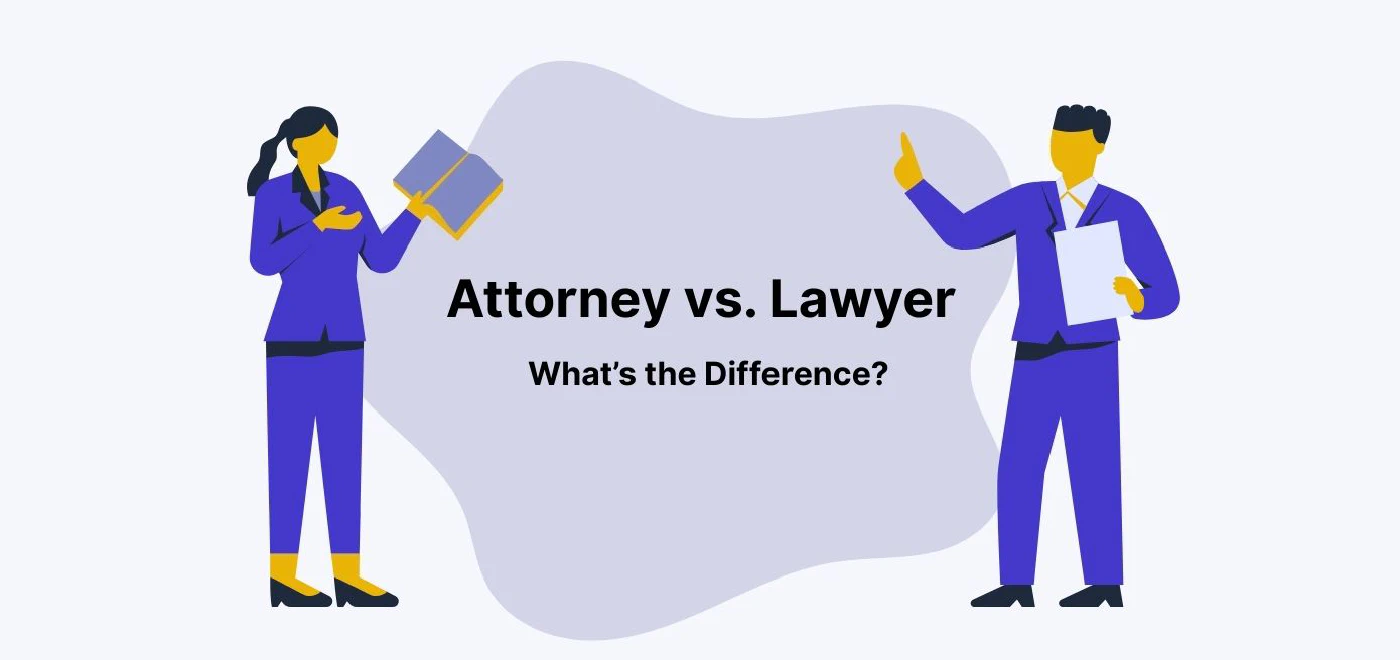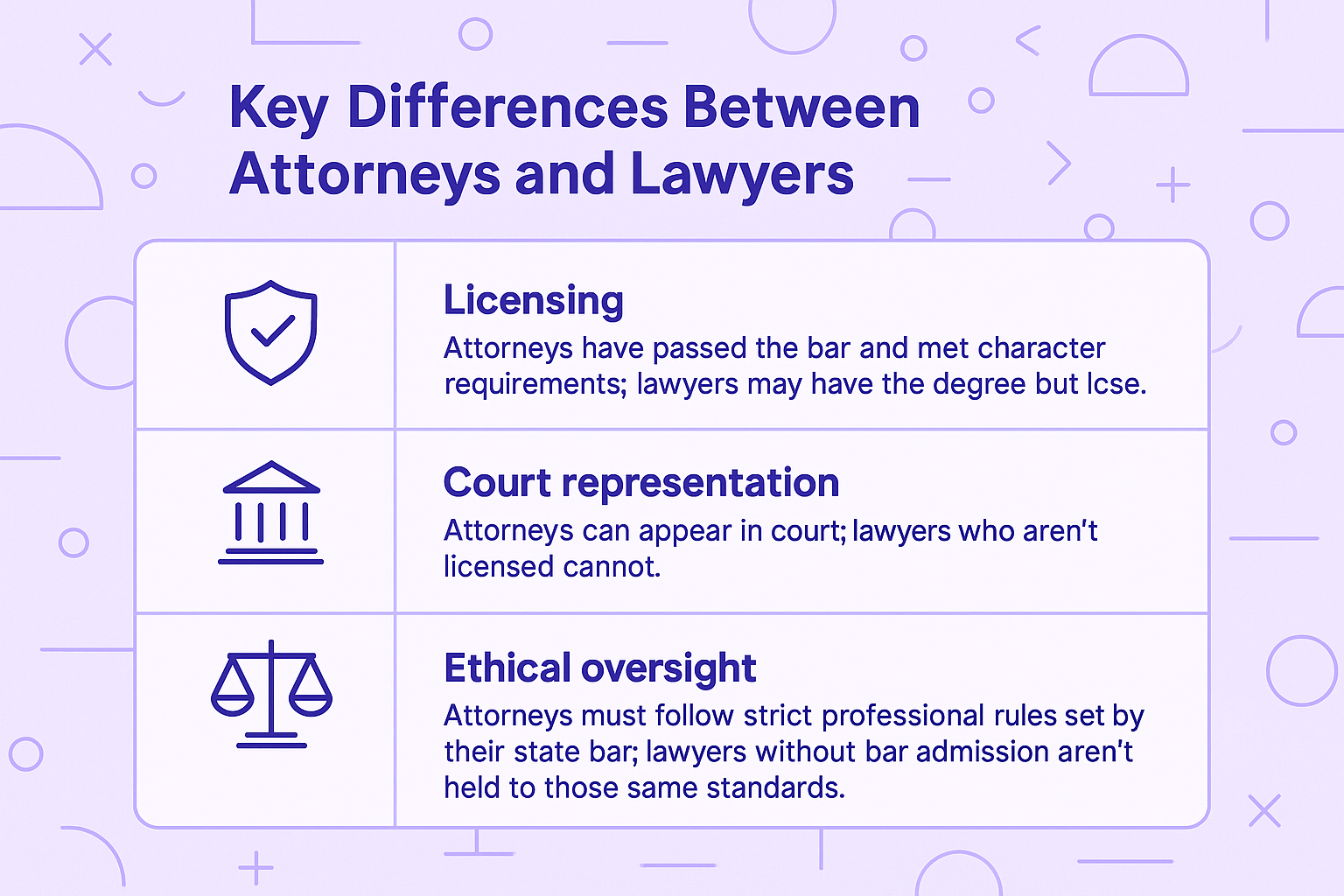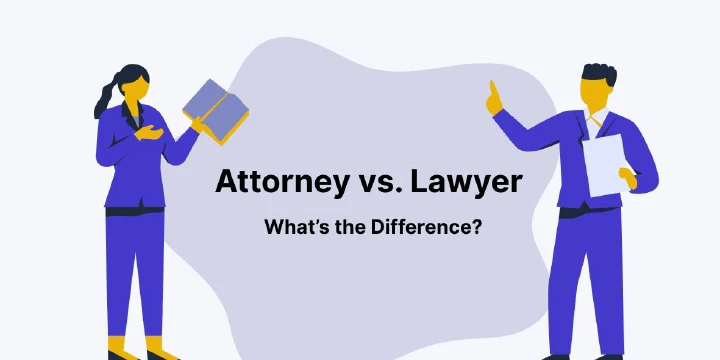What’s the Difference Between a Lawyer and an Attorney
Attorneys and lawyers are not the same: all attorneys are lawyers, but not all lawyers are attorneys. In the U.S., finishing law school makes you a lawyer, but you’re only considered an attorney after passing a bar exam and gaining admission to a state bar. Both roles share the same foundation, usually a three-year JD program, but attorneys go through extra steps, including licensure and adherence to strict ethical codes. After reading this post, you’ll not only know the difference between an attorney and a lawyer, but you’ll also learn about other legal roles that often cause confusion.

Attorney vs. Lawyer: The Main Differences
A lawyer has completed law school. An attorney is a lawyer who’s also passed the bar and is licensed to practice in court.
Every attorney is a lawyer, but not all lawyers become attorneys. Some focus on research, policy, or behind-the-scenes advisory work rather than courtroom practice.



The words have old roots. “Lawyer” dates back to Middle English, while “attorney” comes from Latin advocatus, meaning “someone called to help.” Attorneys are the ones allowed to represent clients in court and file legal documents; they’re also held to state bar rules governing their professional conduct and client responsibilities.
In Definition
Attorney: An attorney (short for “attorney-at-law”) is a licensed legal professional. They’ve earned a law degree, passed a bar exam, and taken an oath to practice law. The title implies the authority to act on behalf of clients and comes with serious responsibilities, such as managing client funds and maintaining confidentiality under state bar rules.
Lawyer: A lawyer holds a JD or LLB and has completed law school but might not be licensed. They can advise clients, draft documents, and support litigation, but they cannot appear in court without passing the bar.
💡 Good to know: Globally, “lawyer” is often a catch-all term that includes solicitors, barristers, and legal advisors, depending on the country.
You’ll Need an Attorney If:
- You’re going to court
- Someone needs to argue your case before a judge
- Legal papers need to be filed officially
- You’re facing criminal charges or a lawsuit
- You want full legal representation, not just advice
- The outcome could seriously impact your rights or finances
A Lawyer Might Be Enough If:
- You just need help understanding a contract
- You’re doing legal research or need general guidance
- There’s no courtroom involved
- You’re exploring your options before taking legal action
- The issue is low-risk and mostly advisory



Qualification Pathways
Lawyers begin by earning a four-year undergraduate degree, then take the LSAT or another accepted exam like JD-Next. From there, they attend a three-year JD program accredited by the American Bar Association. Attorneys take it further. After graduating, they apply to sit for the bar exam in their chosen jurisdiction. Once they pass, they must also go through a character and fitness review, then take a formal oath to join the state bar. Some states have reciprocity agreements, which let attorneys from other jurisdictions practice without retaking the bar, as long as they meet certain criteria. Once licensed, attorneys must meet continuing legal education (CLE) requirements to stay current and maintain their good standing.
Salaries
The median salary for lawyers, including attorneys, was $151,160 in 2024. Compensation depends on practice area, experience, and location. For example, intellectual property attorneys, who often have technical backgrounds and face high demand, averaged $199,306. Early-career professionals typically earn below the median, while seasoned attorneys in top firms or niche specialties can make high six-figure incomes.
Training
Law school spans about three years and covers essential subjects such as different types of contracts, torts, criminal law, property, and constitutional law. To qualify for the bar, programs must meet ABA standards. Some schools offer hybrid or online JD programs, though not all states accept these for bar eligibility. During law school, students join clinics, externships, and moot court to build practical skills before graduation.
Courtroom Representation
Attorneys can:
- Represent clients in court
- File motions
- Conduct trials
- Question witnesses
- Manage appeals
Lawyers who have not passed the bar may assist with case preparation, legal research, and drafting, but they cannot advocate in court. In the U.K. or South Africa, advocates and barristers focus on courtroom work while solicitors handle client relationships and documentation; in the U.S., attorneys often perform both roles.
Here are the differences between an attorney and a lawyer in a glance:
| Category | Lawyer | Attorney |
|---|---|---|
| 🎓 Education | Completed a Juris Doctor (JD) or LLB from an accredited law school | Also completed a JD or LLB from an accredited law school |
| 🧾 Licensure | Not required to pass a bar exam or be admitted to a state bar | Must pass a state bar exam and be admitted to the bar |
| ⚖️ Courtroom Representation | Cannot represent clients in court | Can represent clients in civil and criminal court proceedings |
| 💬 Legal Advice | Can give legal advice in some contexts, depending on the jurisdiction | Fully authorized to give legal advice and act on behalf of clients |
| 📝 Document Drafting | Can draft legal documents, contracts, and other materials | Can draft legal documents and also file them formally with the court |
| 🆔 Professional Title | May use “lawyer” or “JD” | May use “attorney,” “attorney-at-law,” or the honorific “Esquire (Esq.)” |
| 🧭 Ethical Oversight | Not regulated by state bar ethical rules (unless admitted) | Subject to professional conduct rules and disciplinary action by the state bar |
| 🧠 Career Paths | Common in academia, research, policy, legal publishing, or non-courtroom consulting | Can work in private practice, litigation, corporate counsel, public defense, and more |
| 🔁 Continuing Legal Education (CLE) | Not required if not practicing law | Required in most states to maintain licensure and stay current |
| 🛡️ Authority in Legal Matters | Limited, varies by role and jurisdiction | Full authority to act on a client’s behalf in legal matters |
| 🌍 Global Use of Title | Term may refer to solicitors, barristers, or legal advisors, depending on the country | U.S.-specific legal role requiring bar admission |
| 💼 Client Trust Management | Typically not permitted to handle client trust funds | Must manage trust accounts in compliance with strict state bar rules |
| 🏛️ Bar Association Membership | Not a member of the bar unless licensed | Member of the bar in at least one jurisdiction |
Attorney vs. Lawyer: Non-practice Roles
Not every law graduate wants to be in a courtroom. Many take on roles in compliance, mediation, academia, public policy, or legal tech. Others serve as in-house counsel, guiding companies through contract management, regulations, and risk management. Some move into journalism, consulting, or education, applying their legal training in creative ways.
Other Similar Legal Roles
Attorney vs. Lawyer vs. Paralegal
Paralegals support attorneys by preparing documents, managing cases, and conducting research, but they cannot give legal advice or represent clients in court. Lawyers advise clients and do legal work. Attorneys do all that, plus handle court appearances.
Attorney vs. Lawyer vs. Advocate
In jurisdictions like the U.K. or India, advocates focus on courtroom work and are often hired by solicitors to argue cases. In the U.S., “advocate” is a broader term for anyone speaking up for others, regardless of legal credentials.
Attorney vs. Lawyer vs Esquire
Esquire (Esq.) is an informal title used by attorneys in the U.S. who have passed the bar. It doesn’t confer extra powers but signals licensure and professional status.
Attorney vs. Lawyer vs. Counsel
Counsel typically refers to lawyers, often in-house or specialist advisors, who provide legal guidance and strategy, though it can be used interchangeably with attorney or lawyer in formal titles (e.g., “general counsel”).
FAQs
- Is the title “lawyer” legally protected in the U.S.?
- Yes. In most states, calling yourself a “lawyer” requires graduation from an accredited law school, passing a state bar exam, and meeting ethical standards; using the title without meeting these criteria can constitute the unauthorized practice of law.
- Can a law school graduate use the title “attorney” before passing the bar?
- No. Unlike “lawyer,” which some states allow law-degree holders to use informally, the term “attorney” implies bar admission; unlicensed graduates may not hold themselves out as attorneys or attorney-at-law.
- What are the penalties for practicing law or using legal titles without bar admission?
- Engaging in the unauthorized practice of law, or advertising oneself as a lawyer or attorney without a license, can lead to injunctions, civil fines, and even criminal misdemeanor charges under state law.
- How can attorneys practice across state lines under reciprocity?
- Many states honor bar reciprocity or “admission on motion”: attorneys licensed elsewhere, after meeting experience and good-standing requirements (often 3–5 years of practice), may waive into another state’s bar without retaking its exam.
- Are non-attorneys ever permitted to represent clients before administrative tribunals?
- Yes. Under Model Rule 5.5, some jurisdictions allow non-bar members (e.g., foreign lawyers or specialized practitioners) limited authorization, by court order or statute, to appear before administrative agencies or tribunals without full bar admission.
- What is the difference between an attorney-at-law and an attorney-in-fact?
- An attorney-at-law is a bar-admitted lawyer authorized to practice and represent clients in court; an attorney-in-fact is simply an agent appointed by a power-of-attorney document, who may handle business or financial matters but need not be a lawyer.
- Do other countries regulate “attorney” vs. “lawyer” differently?
- Yes. For example, India’s Bar Council recently enacted rules allowing foreign lawyers to advise on non-Indian law by reciprocity, but only Indian-licensed advocates can appear in Indian courts, a distinction unlike the U.S. “lawyer/attorney” split.
Please keep in mind that none of the content on our blog should be considered legal advice. We understand the complexities and nuances of legal matters, and as much as we strive to ensure our information is accurate and useful, it cannot replace the personalized advice of a qualified legal professional.

Table of contents
Want product news and updates? Sign up for our newsletter.
Other posts in Law

What’s the Difference Between a Lawyer and an Attorney
Attorneys and lawyers are not the same: all attorneys are lawyers, but not all lawyers are attorneys. In the …

Guide to Circular Resolutions for Ltd. Shareholders + Templates
Shareholders are involved in decisions such as approving financial statements, electing or re-electing …

Understanding Breach of Contract: Consequences and Prevention
Discover the different forms a contract breach can take, the legal and financial consequences that result, and …
Contracts can be enjoyable. Get started with fynk today.
Companies using fynk's contract management software get work done faster than ever before. Ready to give valuable time back to your team?
Schedule demo

